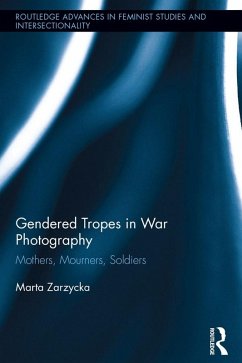Dieser Download kann aus rechtlichen Gründen nur mit Rechnungsadresse in A, B, BG, CY, CZ, D, DK, EW, E, FIN, F, GR, HR, H, IRL, I, LT, L, LR, M, NL, PL, P, R, S, SLO, SK ausgeliefert werden.
Alexandra Juhasz, Chair of the Fim Department, Brooklyn College, CUNY
Mourning women, women protesters, the non-Western girl, the female corpse, the refugee woman, women soldiers - after reading Marta Zarzycka's incisive analysis of these gender tropes, you will never see war photography- or indeed the world - in the same way again. Especially valuable is her use of affect theory for feminist critique of emotional responses such as empathy, mourning, and shame. Picking up where Susan Sontag left off, Zarzycka makes an ambitious and powerful appeal for an ethical spectatorship that can reframe the deployment of gender for documentary purposes.
Ann Cvetkovich is Ellen Clayton Garwood Centennial Professor of English and Professor of Women's and Gender Studies at the University of Texas at Austin, USA.
Mourning, protesting, suffering, dying or fighting: images of the female body in war emerge, in Zarzycka's book, as themselves a battlefield where ideas and emotions about territory, belonging and community struggle for power. Richly theorised and insightfully argued, her benchmark volume on the gendering of war photography is the first to focus systematically on the visual tropes of the female body and their capacity to produce dominant imaginations of collective identity. Zarzycka's is an original and powerful voice that compels us to rethink the crucial interfaces between mediation and gender, affect and politics, nationality and solidarity, 'self' and 'others'.
Professor Lilie Chouliaraki, Department of Media and Communications, London School of Economics and Political Science, UK.









